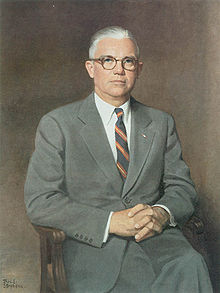Robert T. Stevens
| Robert T. Stevens | |
|---|---|

Robert Ten Broeck Stevens
oil painting by Thomas Edgar Stephans |
|
| 4th United States Secretary of the Army | |
|
In office February 4, 1953 – July 21, 1955 |
|
| President | Dwight D. Eisenhower |
| Preceded by | Frank Pace |
| Succeeded by | Wilber M. Brucker |
| Personal details | |
| Born |
July 31, 1899 Fanwood, New Jersey |
| Died | January 31, 1983 (aged 83) Edison, New Jersey |
| Parents |
John Peters Stevens Edna Ten Broeck |
| Alma mater |
Phillips Academy (1917) Yale University |
Robert Ten Broeck Stevens (July 31, 1899 – January 31, 1983) was a US businessman and former chairman of J.P. Stevens and Company, which was one of the most established textile manufacturing plants in the US. He served as the Secretary of the Army between February 4, 1953 until July 21, 1955.
Stevens was born on July 31, 1899 in Fanwood, New Jersey to John Peters Stevens and Edna Ten Broeck. He attended Phillips Academy and graduated in 1917. He then attended Yale University. He became president of J.P. Stevens and Company in 1929. It is now part of a conglomerate—WestPoint Home.
He served as chairman of The Business Council, then known as the Business Advisory Council for the United States Department of Commerce in 1951 and 1952.
Stevens came into conflict with Senator Joseph McCarthy over a series of issues that ultimately led to the Army-McCarthy hearings of 1954. In the fall of 1953, McCarthy began an investigation into the United States Army Signal Corps laboratory at Fort Monmouth. McCarthy's aggressive questioning of army personnel was damaging to morale, but failed to reveal any sign of the "dangerous spies" that McCarthy alleged to exist. Next McCarthy investigated the case of Irving Peress, an Army dentist who had refused to answer questions in a loyalty-review questionnaire.
As various officers, scientists and other army staff were subjected to McCarthy's often abusive questioning, Stevens was criticized for capitulating to many of McCarthy's demands and not supporting his men.
Concurrent with these events, McCarthy's chief counsel, Roy Cohn, had been pressuring the army, including Stevens, to give preferential treatment to his friend G. David Schine, who had recently been drafted. The Army-McCarthy hearings were held to investigate the Army's charge that McCarthy and Cohn were making improper demands on behalf of Schine, and McCarthy's counter charge that the Army was holding Schine "hostage" in an attempt to halt McCarthy's investigations into the Army. During the hearings, McCarthy questioned Stevens for several days. Although Stevens is generally considered to have handled the hearings poorly, it was McCarthy who fared worst in the month-long investigation. The exposure before a television audience of McCarthy's methods and manners during the hearings are credited with playing a major role in his ultimate downfall. Stevens wanted to resign after the incident but Vice-President Richard Nixon convinced him not to.
...
Wikipedia
